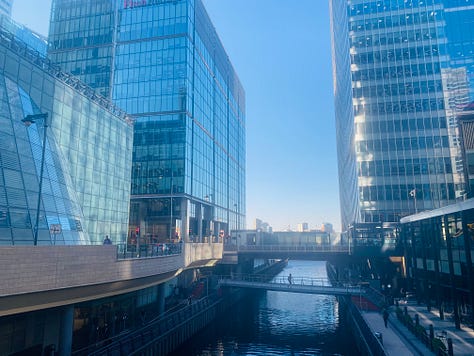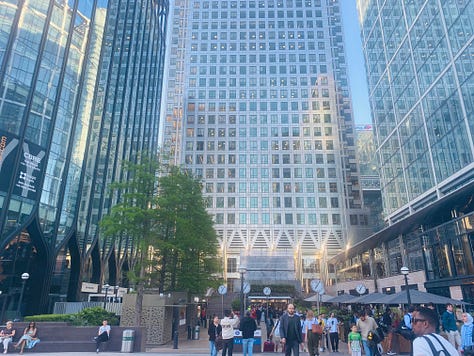Please stop ghosting, and pay us on time. How the treatment of freelancers has now hit rock bottom in 2025.
Sadly manners, ethics and kindness have all but disappeared. Yet do to others as you would have them do to you at all times, including any one who is self-employed,is a good mantra to go by.



A few months ago, I worked for a new publication. To get paid I had to undergo a fraud check, which involved someone phoning me and checking my bank details. I was also told that I needed to send in all my notes, emails and audio recordings when I filed the copy, for fact checking. I was so impressed as this isn’t always done any more. I had high hopes for this company, which was also paying a good rate for once, although in the end all the work, which included a physical interview, didn't end up being worth it. Still, I was optimistic about being reimbursed on time.
Guess what? Even after all of this - the MI5-style security screening included - it took nearly three months and a couple of follow ups to get paid. Do I laugh or cry? The editor was apologetic. None of this is personal. None of this is deliberate. Usually, something’s just gone wrong and the person who commissions us isn’t the person who can get us paid. But of course it's hard not to feel constantly exhausted, upset, deflated and demoralized when you're paid late. Which is now all the time. Every. Single. Time.
In 2025, treatment of freelancers has hit rock bottom. That incident isn’t a one-off. I’ve been a freelancer for a long time and have had some crummy things happen. On three occasions, I’ve had story ideas taken and given to staff journalists. Two of those times the editors didn’t even hide that they were doing this, because they knew that there was a huge power imbalance and there was nothing that I could do. Once I even read my pitch, which was about Africa and very specific, in a magazine. All of these times it’s taken me weeks to get over the disappointment of being treated like this. I’ve waited up to six months, and a year, to be paid at times, too. Still, you could get a response in those days. Things have never felt as bad as they are now, where all you usually get is radio silence. It’s not always like this of course and to all the people out there who treat us with respect: thank you. But most of the time it is.
At the same time, the pay has gone up. Only by an amount that will allow me to buy a grape. There are small wins.
Even editors who I’ve done a lot of physical running around for in the past, and who have benefited from this, and who have told me they were really happy with my work, now ghost. This stings the most, although I’m resilient and will get on with things. It took me over a year to get any response to pitches up until recently from one outlet and then I was told that they had no space for my stories. One editor still completely ignores me. Of course it’s fine if you have no room, but even a “no thanks”, which others sent years ago, is better than silence. I know it’s not just me who is dealing with this, others have written about sending 12 pitches in a row and not hearing back on any of them.
Recently, an editor emailed me nearly a week after I filed copy to let me know that they’d look at the story in a week. That's fine, but of course that means it may be delayed being published by a few weeks and this particular outlet won’t pay until it is. I’ve already asked and they won't change things. To be fair, they’re one of the good ones to work for and also better paying than most.
Another story that I did in February I only got paid for last week, because someone didn’t put the invoice through. I had to push the accounts politely but firmly to get them to follow it up or I wouldn’t have been paid at all. Normally this site is good to work for. And the pay has gone up, which is just about unheard of these days. Only by an amount that will allow me to buy a grape with it. There are small wins.



Why am I writing this piece, which I’ve incidentally made sure has lots of lovely photos accompanying it? I'm not wanting to name and shame anyone, although even if I did, I doubt things would change. I might get paid immediately by those owing me money. But then they’d go back to normal.
When I work with editors who go out of their way to treat us well, I wonder if we should single them out. Last year I worked for one who took the time to call me to brief me. This very rarely happens these days. The day that I sent the work in, she replied to tell me she got it. Some times it can take days, even weeks. I don’t understand why we can’t be acknowledged within a reasonable amount of time after we’ve worked hard on the work and so we know that people have received it. When I filed extra words during the edits, this same editor told me that she was ripping up the invoice and to send another one for more money. This is unheard of. She asked about transport expenses. We don’t get these any more. I was over the moon.
Similarly, whenever I do get any response to a pitch these days, I always take the time to say no worries and thank the person, even if it’s a pass, considering that they’ve replied when they’re also busy. And in the event that I get paid quickly, I always email a thank you. This is nuts in a way that this is considered exceptional when it’s really just standard treatment or called doing one’s job.
Of course it feels like we shouldn't speak about this, particularly when you rely on some of these places for work and want to work for them again. But if we don't how do we expect things to get any better? We get a very rosy picture of freelancing, especially from people selling courses and coaching. And as I said, being treated disrespectfully constantly wears you out even if it’s unintentional. It’s a lot to put up with.
What do I think is behind all of this? Firstly, everyone is burnt out, including editors. They're all having to do more work too. When I hear about the number of stories that staff journalists are expected to write now in a day and what else they're expected to do - everything apart from selling the ads and printing the paper themselves - it’s ridiculous. So everyone is struggling.
People now talk about the “soft fade” in relationships, and in a work context.
Secondly, anyone who is not a permanent worker is sadly disposable and therefore a target for crappy treatment. Last year after it took one outlet three months to pay me and accounts eventually ghosted me when I followed up, I couldn't even get a pay slip as they said they don’t give them to freelancers. That said a lot to me - that as contractors we’re as good as invisible, despite the fact that our words are all over the pages of newspapers and magazines and their sites and so many publications wouldn’t be able to run without us. We’re not even worth giving a receipt to. We don’t exist on the system. As I tried to explain to an editor then, I was sick of checking my bank account, and I needed a record for tax.



It's not just journalists. Any one who is self-employed has to put up with this, and it annoys me when I see freelancers ask in what other industry this happens. The other day I was at my hairdresser’s, who is a friend who I have known for about 17 years. He was chasing up $600 that he’s owed. It’s not the first time I’ve seen him do this. Yes it’s just hair, but it’s disgusting that someone would book any service and then not pay. I’ve also had to chase NGOs for money recently.
Thirdly, ghosting has become such a normalised part of life, creeping into many areas, including friendships and dating, now work, because you can treat people badly and get away with it. People now talk about the “soft fade” in relationships, and with what we do for a living.
Do I think it will get any better? Not really, because as long as someone around the world can be found to do a story for $150 or even for free, as someone else pointed out to me on LinkedIn last year it’s a race to the bottom. When a freelancer posted on the platform recently that a travel outlet had done a call out for pitches from journalists, taken them and then told everyone they couldn’t pay them any more, which was met by outrage from many, it was said that some were even considering still writing the pieces for free. I’ve seen a few freelancers shame outlets anonymously on the site for their low rates. There’s always someone who replies “I’m interested”.
Part of me though wonders if some of the problem lies with us because we’re lacking solidarity. What are we doing to get the rates up? We’re so lucky that in Australia we have a brilliant union MEAA and that the UK has the NUJ, who have achieved better conditions for us, and now there’s initiatives like Women In Media. But personally I think we’re all, myself included, going to have to do more and act if we do want conditions to improve, unfortunately. Also, while we’re finding ways to get around the dearth of job opportunities (free job newsletters and others where you pay a small price) and dismal payments (trying to find high paying content work to subsidize the low paying gigs), this isn’t actually changing much if anything for us collectively in reality. It’s in fact maintaining the status quo. Plus the irony is that you spend time now emailing some editors in these newsletters who are looking for pitches, only to be ghosted. I’ve seen some in interviews say that they respond to every one and I’m sorry, they don’t. They just don’t.
We need to actually figure out how to build things that are sustainable, and we need more and better outlets, too. On Substack now, we’re seeing some new outlets run by freelancers. I wonder if this is part of the answer and it’s going to be interesting to see if they last.
As it's unlikely that we will ever have a proper, enforceable and effective way to regulate people who use freelancers, we now have to hope that people will simply start to treat us a bit better because it’s the right, kind thing to do, and that’s how they’d like to be treated if they were in the same boat. Which in 2025, with the job market being so brutal, could realistically be tomorrow whether by choice or necessity.





Both Google and twitter/X are now offering AI sifted news digests on many subjects. Will there be any change in editing of publications, when AI completely takes over all routine editing work? Will it leave the human "editors" more time to be "human", or will it simply make them all redundant, along with journalists? Will this increase subjective groupthink/fashionable bias, or increase objectivity?
Opposition to AI is partly a repeat of the Luddite opposition to the industrial revolution in textiles. On the one hand, technology makes a cheaper product that is more affordable than the human cottage industry it replaces, and thus enables "more people to buy more". Given a choice of handmade expensive clothing or cheap machine produced stuff, most people go for the cheaper options to cut bills.
I’m sorry you’re having to fight for what should be common decency and that notion we seem to forget - professionalism. I have no real practical words to offer other than the (perhaps naive) hope that there are still good people out there doing good business and that at some point the tides will turn!